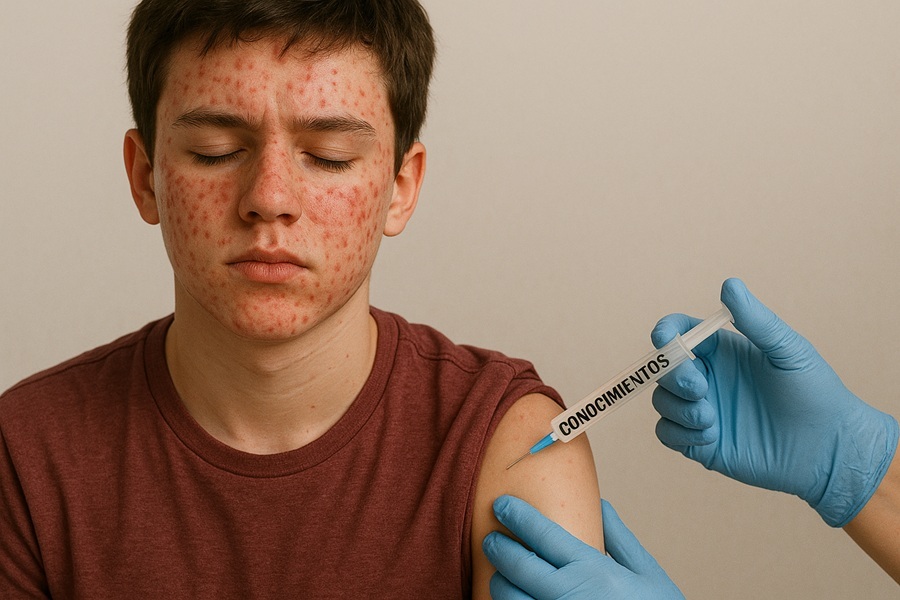- Opinion
- 30 de September de 2025
- No Comment
- 9 minutes read
School Failure: the triumph of will and the placebo school

We are destroying the educational system and universalising failure—not only school failure, but the failure of society itself as a project. / Image generated by AI.

Guiltily or not, the greatest mistake committed when addressing the perennial and vexed issue of school failure, in my view, lies in placing desire before reality, and in the stubborn will to bend the latter to the former, whether it resists or not. This proceeds from the conviction that the mere moral height of the principles invoked suffices to ensure that their proclamation as real will magically transform reality in accordance with their dictates. As if one were constructing a Christmas nativity scene. And if reality continues to resist, then the moral certainty of being on the right path legitimises us in denying it obstinately, while attributing to it increasing guilt.
Like Don Quixote, persuaded that he was the victim of a malicious enchantment when confronted with his peerless Dulcinea transformed into a coarse peasant girl. What is absolutely forbidden is to ask whether such principles might be wholly or partly inadequate to the reality upon which we apply them—for this would entail questioning them in their entirety, at least within a model of absolutes such as the one we inhabit, where the idea is both origin and destination. Nor is the real focus the educational system itself, but one of its epiphenomena; the idea functions not as a regulative principle enabling critical progress rather than obstinate stagnation, but as an unconditional imperative.
We might call this the triumph of will over reality. A vainly vainglorious triumph, confined in any case to the strictly declarative. Something akin to decreeing the right to happiness by prohibiting unhappiness. It is not even a Pyrrhic victory, but an imagined one over a non-existent enemy who must nevertheless be invented. An error in close accord with today’s fashionable notion that it is enough merely to wish to be something in order to become it. The primacy of the declarative over the real. A crude confusion of morality with knowledge, of good with truth. As popular wisdom more prosaically puts it: “there is many a slip ’twixt cup and lip”.
Even so, there is a difference between a lie and an error. A lie is the conscious falsification of known reality; an error is the result of mistaken reasoning or calculation. The former belongs to the moral order, to practical discourse, whereas the latter belongs to the order of knowledge, to theoretical discourse. But of course, the lies of some seek to induce the errors of others. If a politician or an educational demagogue guarantees universal school success, they are lying; if anyone believes them, they are in error. To play with this is sheer immorality.
Since the first vaccines (E. Jenner, 1796) and antibiotics (A. Fleming, 1928), we have known that certain individuals are allergic to one vaccine or another, to this or that antibiotic. In the case of penicillin, for example, around 10% of the population. A not inconsiderable proportion. Yet such allergies were unknown until mass vaccination campaigns were launched or the use of antibiotics became widespread. Their overall effect, seen in retrospect, can only be regarded as positive. Likewise, the fact that some could not benefit from the smallpox vaccine—or that, for some, inoculation had fatal consequences—never led to its withdrawal or prohibition. Among other reasons, because to have proscribed it would have meant millions continuing to die, allergic or not. Today smallpox is considered eradicated, which in the end has benefited both groups alike.
To proclaim the need to eliminate school failure is a declaration of principle, much like proclaiming the need to eradicate smallpox; but embarking upon such a task is a practical matter requiring method, knowledge, information, and prior analysis conditioned by the nature of the reality to which it is applied. That is to say, only as far as feasible, and always conscious of the limitations of our capacities. To will is not necessarily to be able; to know may not be sufficient either, but it is closer, and though not a sufficient condition, it is a necessary one. Otherwise, we must accept that the donkey in the Spanish fable who played the flute by sheer chance was in fact a refined music-lover.
Let us suppose that school failure is akin to an “allergy”, or to multiple “allergies”, to the educational system. In that case, the first step is to acknowledge that school failure is real and that, however much we succeed in reducing it, it will always persist in some proportion—at least so long as human nature remains what it is and school remains what it is meant to be: a vaccine, not a mere placebo. The second is to accept that, just as there is preventable school failure, there is also some that is tragically and fatally inevitable. No one likes to accept this, of course, but here we are not speaking of preferences.
Subject always to critical revision in the light of results, the task regarding school failure must be to provide remedies and palliatives that open dignified pathways, or its overcoming where possible, together with the stimuli needed to address the causes that tend towards such failure. But not to officialise it under misleading euphemisms or indulge in victimhood. In other words, if examinations cause a pupil panic attacks, what they need is not exemption, but to learn to manage and overcome such panic.
We should also not forget something all too obvious, yet all too often neglected: school failure is an epiphenomenon, a side effect, of the educational system. If we denaturalise the school to avoid school failure, then it is no longer a vaccine but a placebo, and this is akin to cutting off one’s head to cure a headache. If we decree, for instance, the reduction of content, universal passes, or automatic promotion, we are simply pulling the wool over our own eyes, while deceiving the system’s users—the pupils themselves. And although it may be a truism, we can only know that school failure exists if the context in which it occurs is present. There are no allergic reactions without vaccines. It is no solution to ban vaccines in order not to discover allergies, or because their existence contradicts our theories or desires.
Had the educational system been converted from the outset into the farce now being played out, we should never have discovered that some of the population are allergic to vaccines or antibiotics—for there would have been no vaccines, no antibiotics; and we would still be at the mercy of smallpox, the bubonic plague, and of sorcerers who invoked rain with dances to the croak of frogs. In short, we would still be mired in the ignorance to which some now seek to return us.
Yes, there are faults and fault-bearers, in a veritable rogues’ gallery, and there are victims; but that must be left for another day. For the moment let us hold fast to this: that school failure is a problem we must combat with every means at our disposal; but also, that it is school failure that must adapt itself, to some extent, to the educational system, and never the reverse without qualification. Outside this perspective, we are destroying the educational system and universalising failure—not only school failure, but the failure of society itself as a project.
___
[i] https://www.aaaai.org/tools-for-the-public/biblioteca-de-condiciones/biblioteca-de-alergia/alergia-a-la-penicilina-%C2%BFque-debe-saber
[ii] n 1980, the WHO certified the eradication of smallpox worldwide. https://es.wikipedia.org/wiki/Viruela
Source: educational EVIDENCE
Rights: Creative Commons

